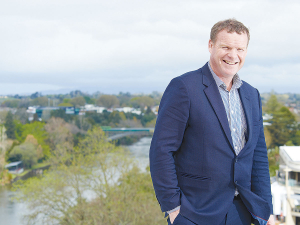Farmer confidence dips slightly, but positivity still dominates
Farmer confidence has taken a slight dip according to the final Rabobank rural confidence survey for the year.
 Rabobank New Zealand chief executive Todd Charteris says the small lift comes off the back of continued strong demand for New Zealand’s key agricultural product from overseas markets.
Rabobank New Zealand chief executive Todd Charteris says the small lift comes off the back of continued strong demand for New Zealand’s key agricultural product from overseas markets.
Farmer confidence could be headed up, according to the latest Rabobank Rural Confidence Survey, but farm costs remain a worry.
The survey, completed late last month, found farmer confidence was slightly up on the previous quarter, climbing to -31% from -35% previously.
The minor lift follows a plummet in the June quarter which saw sentiment drop to its lowest level since the beginning of the Covid-19 pandemic.
Rabobank New Zealand chief executive Todd Charteris says the small lift comes off the back of continued strong demand for New Zealand’s key agricultural product from overseas markets.
“Increasing demand and rising commodity prices emerged as the major sources of optimism identified by farmers with a positive outlook,” he says.
Charteris adds that farmers will be pleased to see demand and prices for their products holding up in spite of the economic challenges facing the global economy.
He says that while commodity prices are staying strong, pessimism remains the dominant sentiment among New Zealand farmers.
“The number of farmers holding a negative outlook on the prospects for the agri economy outweighs those with a positive view by more than three to one, and farm input costs continue to be the major reason for this,” Charteris says.
Last quarter, the survey saw the highest level of concern ever expressed in relation to input costs, Charteris says, and that number has risen.
Seventy one percent of farmers with a pessimistic outlook now name rising farm input costs as a reason for apprehension, he says.
The rise in input costs was reflected in the most recent farm expenses price index, which had a 4.8% rise according to Stats NZ.
Stats NZ business prices delivery manager James Mitchell says farm expenses were at the highest level Stats NZ has measured since the index started in 1993.
“On average, for all farm types, expenses were 13.4 percent higher in the June 2022 quarter than they were in the June 2021 quarter,” he says.
Charteris says the rise in farm inputs and its contribution to the feeling of pessimism among farmers comes as no surprise given that prices for fertiliser, fuel and feed have risen since Russia’s invasion of Ukraine in February this year.
“And with the recent decline in the Kiwi dollar against the greenback now starting to flow through to further price increases for imported farm inputs, farmers continue to see input prices as the biggest threat to the agri economy in year ahead,” he says.
The survey also found government policy to be the second most prominent concern for New Zealand farmers.
The survey also found farmers’ investment intentions were marginally lower than in the previous quarter with 18% of those surveyed now expecting to increase investment over the next year and 19% planning to decrease investment.
“Across all farm types, less than one in five farmers is looking to decrease investment on the prior year, and this illustrates that despite the short-term challenges facing the industry, farmers are broadly positive about the longer-term outlook for the sector and, as a result, are prepared to continue investing in their operations,” Charteris says.
Additional reductions to costs for forest owners in the Emissions Trading Scheme Registry (ETS) have been announced by the Government.
Animal welfare is of paramount importance to New Zealand's dairy industry, with consumers increasingly interested in how food is produced, not just the quality of the final product.
Agriculture and Forestry Minister Todd McClay is encouraging farmers and growers to stay up to date with weather warnings and seek support should they need it.
The closure of SH2 Waioweka Gorge could result in significant delays and additional costs for freight customers around the Upper North Island, says Transporting New Zealand.
OPINION: The year has started positively for New Zealand dairy farmers and things are likely to get better.
Ministry for Primary Industries (MPI) Director General Ray Smith believes there is potential for an increase in dairy farming in New Zealand.